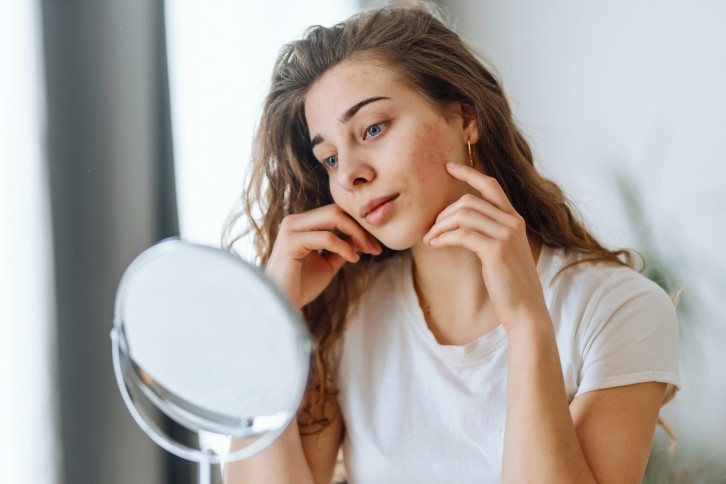Lysine-dendrimer: a gentle yet effective acne treatment that maintains skin microbiome, says study

Acne is a common yet debilitating inflammatory skin disease that affects the quality of life of sufferers.
The skin disease, which presents as inflammatory and non-inflammatory lesions on the face, chest and back predominantly affects teenagers and can result in skin scarring and mental health issues such as depression and loss of confidence.
According to a 2022 study in the International Journal of Dermatology, the skin disease affects 80% teenagers and 20% of adults over the age of 25.
Although there are various topical treatments to treat acne – such as benzoyl peroxide and salicylic acid – their effectiveness often wanes over time due to increased resistance to the treatment. Plus, these solutions can cause problematic side effects, which includes creating other skin issues. Therefore, researchers are still keen find better solutions for acne.
Combating Cutibacterium acnes
A recent approach to acne treatment targets the pathogen Cutibacterium acnes while maintaining the homeostasis of the skin microbiome.
A previous study (by Attia-Vigneau et al) showed that the use of a G2 lysine dendrigraft (G2 dendrimer) could specifically decrease the C. acnes phylotype (IAI) that is involved in causing acne, compared to non-acne-causing C. acnes (phylotype II) bacteria.
To further prove this study and monitor the effect of the lysine-dendrimer on the skin microbiome, researchers from University of Rouen in Normandie teamed up with beauty companies Shiseido, Lucas Meyer and Sequential Skin to conduct an in-vivo study.
The researchers first carried out a clinical study with G2-Dendrimer versus a benchmark. Sixteen acne-prone Caucasian male and female volunteers aged 14 to 40 years old were recruited to evaluate a cream containing 1% G2-dendrimer versus a benchmark containing 10% benzoyl peroxide. The volunteers applied the products on clean, dry skin under normal conditions of use twice a day, on split face by slight massage for 28 days. On day 0 and at the end of the application, the dermatologist counted blackheads and whiteheads (non-inflammatory lesions) as well as papules and pustules (inflammatory lesions) on each hemi-face.
Next, researchers undertook a clinical study using G2-Dendrimer in full formulation on 22 acne-prone participants, aged 22–63, over a period of 18 days.
The formulation contained: aqua (water), glycerin, propanediol, lactic acid, inulin, alpha-glucan oligosaccharide, acetum (vinegar), maris aqua (sea water), arginine, fructose, glucose, hibiscus sabdariffa flower extract, laminaria digitata extract, chlorella vulgaris extract, polylysine, cellulose gum, caprylyl glycol, xanthan gum, cellulose, phenethyl alcohol, saccharide isomerate, tetrasodium glutamate diacetate, sodium hydroxide, sodium benzoate, potassium sorbate.
Each participant’s skin microbiome was sampled at four time points: baseline (before wash-out), on day 4 (following 4 days of application of 100% squalene), day 10 (following 6 days of use of 0.4% G2-dendrimer in the full formulation), and day 18 (following 8 days of 0.4% G2-dendrimer in formulation).
S. aureus and S. epidermidis biofilm formation during exposure to G2 was also evaluated on three occasions using 24-well culture flat glass bottom plates that were incubated overnight at 37 °C.
Plus, skin microbiome samples were collected from the participants using the Sequential Skin Kit. An adhesive patch was applied on the participant’s cheek for 10 seconds and then analysed to assess the skin microbiome.
Targets acne “while respecting the cutaneous microbiota”
Matching the results of the previous study, the team confirmed that G2-dendrimer application significantly decreased the number of non-inflammatory lesions compared to day 0, by -21%.
It also noted that the effect of G2-dendrimer on the number of noninflammatory lesions was stronger than that of the reference product, for which no statistically significant changes were observed between day 0 and day 28.
These effects were observed more clearly in the pustule counts. The G2-dendrimer effected a strong (72%) decrease, the benchmark saw no changes.
The data also confirmed that after treatment of bacterial cultures and biofilms, the G2-dendrimer didn't affect non-acneic C. acnes nor commensal bacteria of the skin (Staphylococcus epidermidis, S. hominis, and Corynebacterium minutissimum).
Finally, metagenomic analysis of the cutaneous microbiota of volunteers who applied a finished cosmetic product containing the G2 dendrimer confirmed the G2's ability to rebalance cutaneous acne microbiota dysbiosis while maintaining commensal bacteria.
Outperforms Salicylic acid & Benzoyl peroxide
The G2-dendrimer decreased signs of acne and rebalanced C. acnes dysbiosis, while other main facial skin bacteria was unaffected by treatment.
In comparison, Salicylic acid had a drastic effect, reducing all commensal bacteria tested by 50% after less than 20 minutes. While Benzoyl peroxide reduced bacteria survival by 50% after approximatively 1 h for non-acneic C. acnes and C. minutissimum after 2.5 h for S. hominis and after over 3.5 hours for acneic C. acnes and S. epidermidis.
The researchers stressed the importance of maintaining balanced cutaneous bacterial communities, because they act together to control acne through their role in immune homeostasis and inflammatory responses.
In healthy skin, Cutibacterium and Staphylococcus bacteria strains maintain microbiota health by fighting pathogens and participating in skin homeostasis through the production of beneficial bacterial metabolites. However, these bacteria can shift into ‘opportunist mode’ and trigger skin dysbiosis associated with additional skin disorders.
Source
“Lysine-Dendrimer, a New Non-Aggressive Solution to Rebalance the Microbiota of Acne-Prone Skin”
https://www.mdpi.com/1999-4923/15/8/2083
Pharmaceutics 2023, Special Issue Applications of Dendrimers in Biomedicine)
Authors: Julie Leignadier; Marie Drago; Olivier Lesouhaitier; Magalie Barreau; Albert Dashi; Oliver Worsley; Joan Attia-Vigneau






















